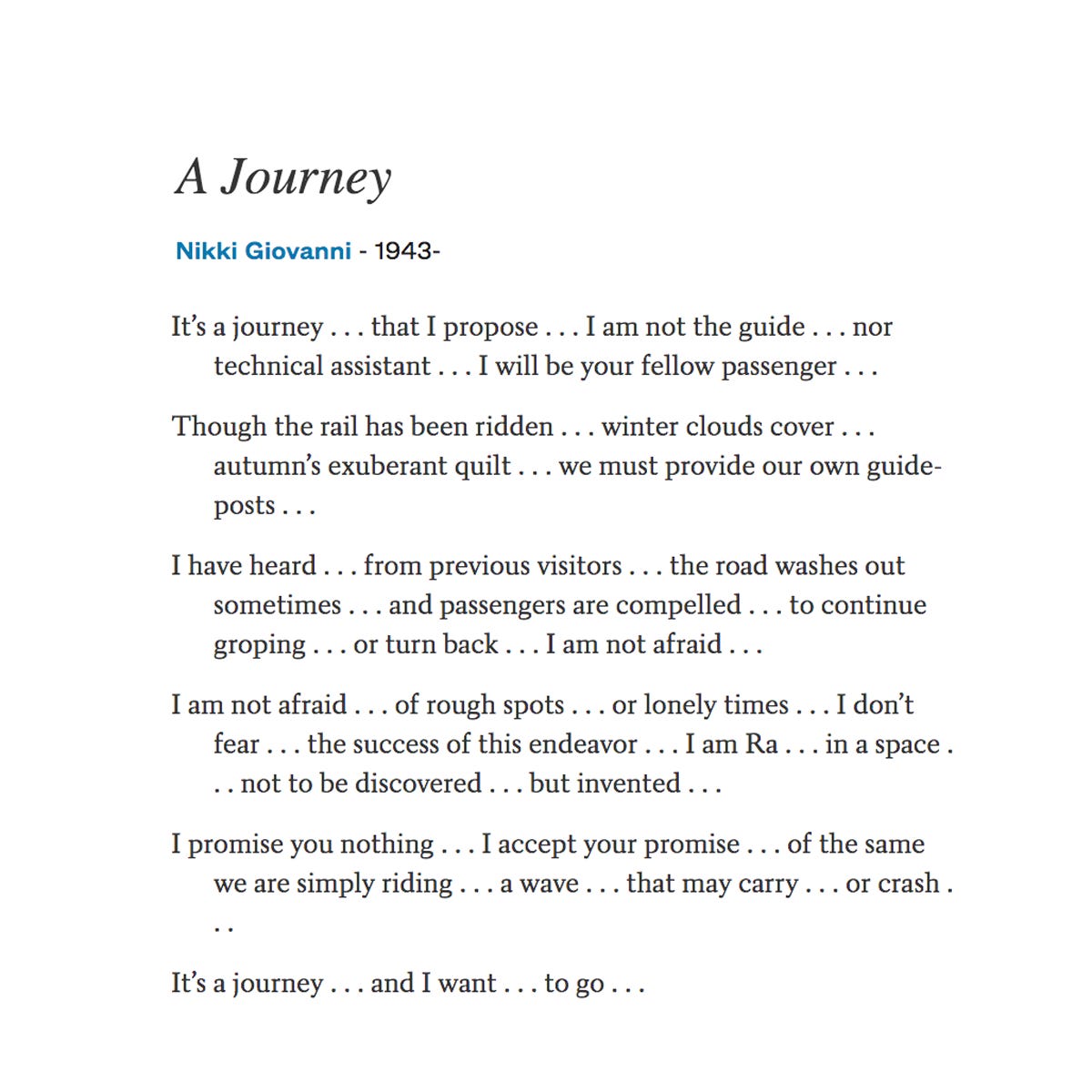Nikki Giovanni died this week. I am ashamed to admit I didn’t know who Nikki Giovanni was before she died, given the immense gifts she offered to the world. Check out this obituary to learn more. After learning of her passing, I decided to read some of her pieces. The power of her words jump off the screen.
One piece in particular caught my attention.
The viviv language paints a picture. The way the poem is formatted with the ellipses lends itself to the staccato-like nature of a story that is rapidly unfolding. The notion that we are all on this journey together is deeply resonant. I have been spending a lot of time thinking about what it means to be in relationship with texts, a pillar of the work that I do. What happens when we are confronted with texts that are painful?
In an overly simplistic binary, we can either opt in or opt out. Of course there’s more gray to this but so often I hear folks check out from engaging with a text because it’s too…whatever. This saddens me. I know there are texts that are deeply wounding especially in the Jewish tradition. And yet, I know those texts have been deeply wounding for centuries and they remain. For amid the painful letters and lines, there is wisdom to mine.
That’s what caught my attention from Giovanni’s words.
Sometimes the road washes out…and passengers are compelled…to turn back…I am not afraid.
That courage stands out. To be on a journey, recognize that it’s a worn path, see something challenging that confronts you, and proclaim that you’re not afraid of rough spots or lonely times. That is intellectual bravery.
I’m worried we are losing something as a people when we wantonly disregard timeless wisdom because it agitates us. It’s ok to brazenly call out a text but to do that, you have to be in relationship with it. Keep learning; you have to live in the mindset of:
It’s a journey…and I want…to go.
Lest we think Giovanni’s words are representative of a modern area, let’s go back to 1190 when famed Jewish thinker, theologian, philosopher, and physician Maimonides wrote his Guide For the Perplexed. The text’s audience, in broad strokes, was the faithful and religious person who also had a clear grounding in secular philosophy. In other words, he was writing for someone who approached religious texts with multiple identities, someone who might be confronted with something in a spiritual text and wonder, “is this ok?”
Here is what he wrote in I:31:
Alexander of Aphrodisias says that there are three causes of disagreement about things…However, in our times there is a fourth cause that he did not mention because it did not exist among them. It is habit and upbringing. For humans have in their nature a love of, and an inclination for, that to which they are habituated…In a similar way, humans have love for, and the wish to defend, opinions to which they are habituated and in which they have been brought up and have feelings of repulsion for opinions other than those. For this reason also a person is blind to the apprehension of the true realities and inclines toward the things to which they are habituated.
Quoting one of the great commentators on Aristotle, Alexander of Aphrodisias, Maimonides adds one category to elements that cause strife among human beings: we like to stick to things we know, must to our demise.
He uses the example of the Israelites in the desert who constantly yearn to return to slavery from the freedom they have been given, because it is familiar to them. In a similar way, I see him speaking to the topic at hand. We seek out the comfort of texts that espouse ideologies with which we are familiar. In doing so, we prevent access to so much wisdom and growth.
We are so afraid of the unknown in many areas. What might it look like to embrace an attitude of openheartedness when it comes to texts? Approaching them with a mindset of curiosity would allow us to funnel out that which is problematic and learn from the kernels of what remains.
Maimonides argues that this mindset blocks a person from accessing השגת האמיתוֹת, comprehension of The Truth. I think he means that literally in a divine writ sort of sense; I don’t. I think there are multiple truths that allow for more accessibility. Nonetheless, you’ve got to be in relationship with it to figure out what is what. After all, it’s a journey…I am not the guide…I will be your fellow passenger. Will you join?
Shabbat Shalom and Happy Weekend!


Love this. Love Mrs. Giovanni's poem. Have been on a horrible "commute" of a journey of late. Safe, known, relaxed? For sure. But awfully boring and totally uninspiring. I'm driving an older car these days and have become more scared of breaking down on the side of an unfamiliar road. Not to mention, I'm not even really sure where I want to visit for my next destination. I just know that my car's shocks are totally worn, and the ride has become increasingly uncomfortable. But it's not scary and uncomfortable, so I mindlessly continue to travel along the same bumpy, well-traveled, roads. Probably will continue until one day I go to start my car and the only sound I'll hear is a sputter. But I also really love that new car smell...so, maybe?
BTW, don't know if you know, but you played many years of sunday football with Nikki's son!
Also, I love that the Rambam was talking about confirmation bias a millennia ago!